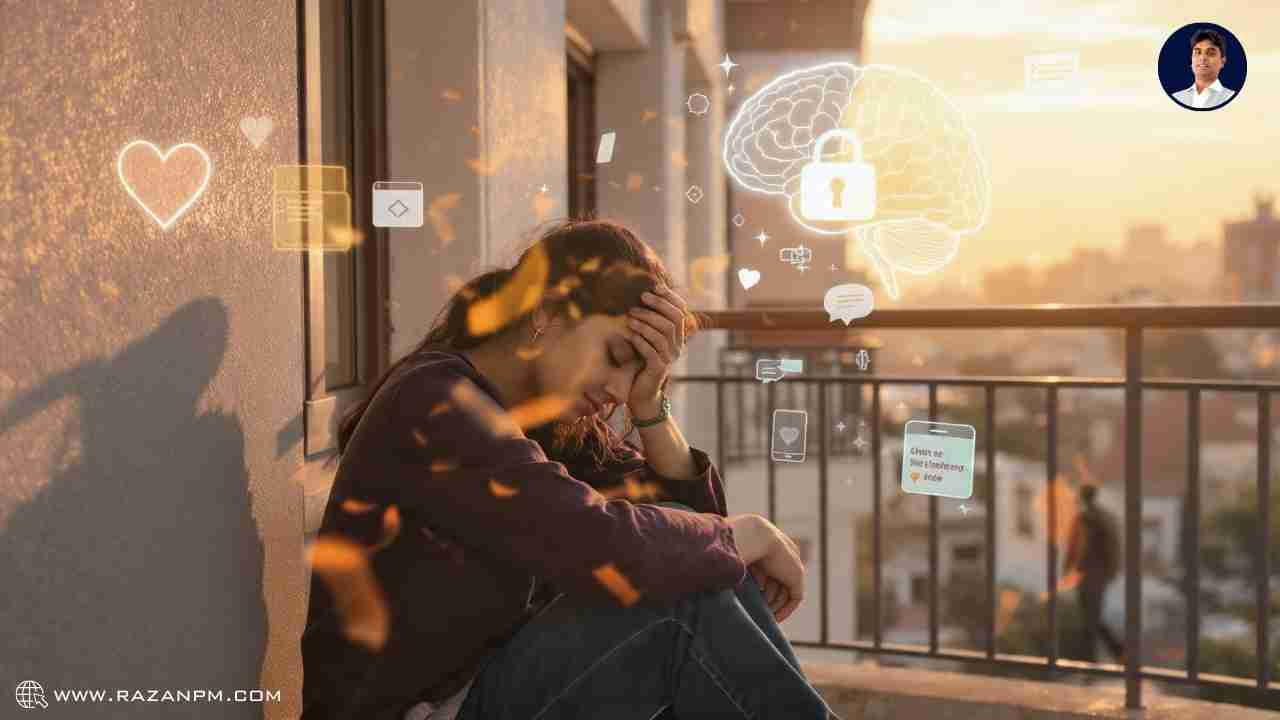You know that tiny moment when someone doesn’t reply to your message for two hours… and your brain turns into a full-time crime investigator?
“Maybe they’re ignoring me.” → “Maybe I said something wrong.” → “Maybe they never liked me!”
Funny, right? But behind that overthinking is a real emotional storm.
We laugh it off, call it “I’m just overthinking,” but what’s really happening is a quiet war between fear of rejection and our need for connection.
This fear, left unchecked, can silently kill real relationships — romantic, professional, even friendships.
also read: why timing turns simple talks intobig arguments

As a Govt.Recognized Counsellor & Mind Healer, I often meet people who say,
“I want to connect deeply… but I’m scared they’ll leave once they know the real me.”
This fear turns into a protective shell. You start filtering your emotions, hiding your needs, and presenting a polished version of yourself — because what if they don’t accept the real you?
But here’s the twist: the more you hide, the more disconnected you feel.
Ironically, your fear of rejection ends up creating the very loneliness you were running from.
also read: how bias turns into deep depression?
You might relate to this:
It’s exhausting, na? 🥺
That’s what I call “Emotional Self-Censorship” — and it’s one of the biggest killers of genuine connection.
also read: how to tell if emotional separationhas already started?

1. Over-Apologizing: You say sorry even when you did nothing wrong.
2. Avoiding Conflict: You agree to things just to keep peace.
3. Constant People-Pleasing: You prioritize others’ comfort over your truth.
4. Reading Too Much Into Messages: A small delay triggers emotional panic.
5. Needing Reassurance: You often ask, “Are you mad at me?”
6. Low Self-Worth: You feel undeserving of love or praise.
7. Emotional Withdrawal: You shut down before someone else can reject you.
These behaviors may seem minor — but collectively, they indicate relationship anxiety and rejection sensitivity.
also read: why kind words create misunderstanding?
In the DSM-5 (Diagnostic and Statistical Manual of Mental Disorders), this pattern often overlaps with Avoidant Personality Traits or Social Anxiety Disorder — where individuals avoid closeness to prevent possible humiliation or rejection.
The ICD-11 (International Classification of Diseases) also links this fear to emotional dysregulation patterns, where self-esteem depends heavily on external validation.
In simpler terms — your brain treats rejection as danger, just like physical pain.
Research shows that the same brain regions (the anterior cingulate cortex) light up when we experience social rejection as when we experience physical pain.
That’s why rejection doesn’t just “hurt” emotionally — it literally hurts the brain.
also read: how caregiving triggers hidden depression?

🔹 A study from the Journal of Personality and Social Psychology (2018) found that people with high rejection sensitivity tend to misread neutral cues as negative — like assuming a partner’s silence means disapproval.
🔹 Neuroscientist Naomi Eisenberger found that social rejection activates the same pain pathways as physical injury, proving that the phrase “heartbreak hurts” isn’t just poetic — it’s neurological fact.
also read: how fibromyalgia fuels hiddendepression?
Let me share a small story (names changed for privacy).
Rhea, a 29-year-old graphic designer, came to me feeling “emotionally exhausted.”
She said, “I just can’t connect with people anymore. I overthink every message, every silence feels like a rejection.”
As we worked together, we uncovered a childhood memory — being scolded harshly by her parents whenever she expressed her emotions. Over time, her mind learned:
“If I express too much, I’ll get rejected.”
Fast-forward to adulthood, her brain still followed the same script.
We began gentle exposure therapy and emotional regulation techniques — helping her slowly test vulnerability in small doses.
The first time she honestly told her friend, “I felt hurt when you cancelled our plan without telling me,” she expected anger. Instead, her friend said, “Oh gosh, I didn’t realize! I’m so sorry.”
That moment changed everything.
Rhea learned that honesty doesn’t always bring rejection — sometimes, it deepens love.
Now, she leads a small journaling group to help others process emotional fears.
also read: why saying i love you is not enough?

Let’s make this practical.
Here’s a small but powerful tool I teach my clients:
Next time you feel anxious (“They’ll leave me,” “They’ll judge me”), write it down.
Example: I’m scared they’ll stop talking to me if I say how I feel.
Step 2: Challenge Negative Thought Patterns
Ask yourself: What’s the proof? Has this always happened?
Usually, your mind predicts rejection based on old pain, not current truth.
Instead of “What if they reject me?” ask “What if they understand me?”
This gentle shift rewires your brain toward connection, not avoidance.
Try this for one week. Write your reflections daily.
You’ll notice your emotional triggers soften — slowly, but beautifully. 🌼
This small practice is just a preview.
True healing involves unlearning deep-rooted patterns of emotional fear — something that often needs guided therapy, inner child work, and mind-body reconnection exercises.
Because fear of rejection isn’t just a thought — it’s stored in your nervous system, your body memory, your tone, even your silence.
And healing it requires a journey — one that’s both scientific and soulful.
also read: why emotional intimacy feels unsafefor some partners?
If this feels familiar, you don’t have to go through it alone.
As a Govt.Recognized Counsellor & Mind Healer, I help individuals rebuild emotional safety and learn how to connect deeply — without fear controlling their voice.
If your heart whispered “This is me” while reading this, maybe it’s time to listen to that whisper.
You deserve connection that feels calm, not fearful.
Let’s explore your healing journey together - Book your 1:1 consultation here.
👉 Begin Your Journey with a 1 on 1 Consultation
👉 Begin Your Journey with a 1 on 1 Consultation

Fear of rejection often stems from early emotional experiences — like childhood criticism, neglect, or conditional love.
Over time, your brain learns that expressing your real emotions equals danger.
This creates relationship anxiety where you avoid honesty to stay “safe,” but ironically, it leads to loneliness.
also read: how hormonal shifts can trigger depression?
When you fear rejection, you hide your truth, avoid vulnerability, and start people-pleasing.
This blocks emotional intimacy and prevents deep connection.
True connection needs honesty and trust — not constant self-protection.
also read: how chronic pain fuels depression atany age?
Yes — absolutely.
Therapeutic techniques like Cognitive Behavioral Therapy (CBT), Inner Child Work, and Mindfulness-Based Emotional Regulation help you reprogram fear responses.
Working with a clinical psychologist allows you to face emotional triggers safely and rebuild confidence in relationships.
also read: when silence turns intomisunderstanding?
You may have rejection sensitivity if you:
If these feel familiar, it’s not weakness — it’s your nervous system seeking safety.
also read: the emotional burden behind thebody’s battles
Start small:
1. Name your fear (“I’m scared they’ll leave if I’m honest”).
2. Challenge it with logic (“Do I have proof?”).
3. Replace it with curiosity (“What if they understand me?”).
This simple fear reset technique helps you rewire emotional reactions over time.
also read: 10 coping tools for depression aftertrauma
Because your brain treats social pain like physical pain.
Studies show rejection activates the same neural pathways responsible for physical injury.
That’s why “heartbreak” actually hurts — it’s not just emotional; it’s biological.
also read: why love feels hot then cold?
Emotional safety grows from consistency, clear boundaries, and gentle honesty.
Start sharing small truths with trusted people.
With time, your nervous system learns that vulnerability doesn’t always bring pain — sometimes, it brings peace.
also read: digital romance, real loneliness genz truth
